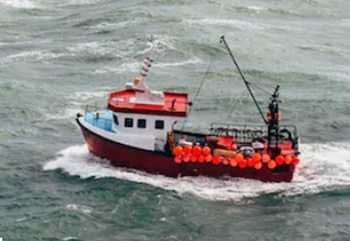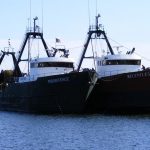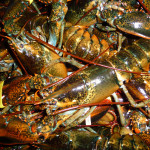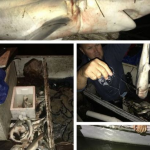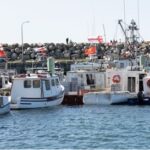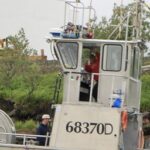Tag Archives: Duke University
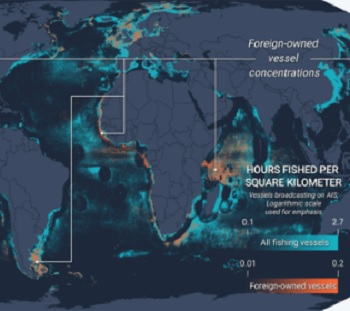
New research reveals shifting identities of global fishing fleet to help bolster fisheries management
A new study published today in Science Advances combines a decade’s worth of satellite vessel tracking data with identification information from more than 40 public registries to determine where and when vessels responsible for most of the world’s industrial fishing change their country of registration, a practice known as “reflagging”, and identify hotspots of potential unauthorized fishing and activity of foreign-owned vessels. The study, “Tracking Elusive and Shifting Identities of the Global Fishing Fleet” found that close to 20 percent of high seas fishing is carried out by vessels that are either internationally unregulated or not publicly authorized, with large concentrations of these ships operating in the Southwest Atlantic Ocean and the western Indian Ocean. >click to read< 18:28
Bycatch Reduction Engineering Program – 2017 Awards
 NOAA Fisheries has awarded more than $2.3 million to partners around the country to support innovative bycatch reduction research projects through its . Bycatch of various species–fish, marine mammals, or turtles–can have significant biological, economic, and social impacts. Preventing and reducing bycatch is a shared goal of fisheries managers, the fishing industry, and the environmental community. click here to read the notice 14:10
NOAA Fisheries has awarded more than $2.3 million to partners around the country to support innovative bycatch reduction research projects through its . Bycatch of various species–fish, marine mammals, or turtles–can have significant biological, economic, and social impacts. Preventing and reducing bycatch is a shared goal of fisheries managers, the fishing industry, and the environmental community. click here to read the notice 14:10
Two Hundred Million Dollar Scientific Grant Fraud Case against Duke University
 Federal Prosecutors have launched a gigantic fraud case against Duke University, North Carolina, accusing Duke University of embezzling $200 million in federal research grants, by presenting doctored data with their grant applications. – On a Friday in March 2013, a researcher working in the lab of a prominent pulmonary scientist at Duke University in Durham, North Carolina, was arrested on charges of embezzlement. The researcher, biologist Erin Potts-Kant, later pled guilty to siphoning more than $25,000 from the Duke University Health System, buying merchandise from Amazon, Walmart, and Target—even faking receipts to legitimize her purchases. A state judge ultimately levied a fine, and sentenced her to probation and community service. Then Potts-Kant’s troubles got worse. Read the rest here 13:03
Federal Prosecutors have launched a gigantic fraud case against Duke University, North Carolina, accusing Duke University of embezzling $200 million in federal research grants, by presenting doctored data with their grant applications. – On a Friday in March 2013, a researcher working in the lab of a prominent pulmonary scientist at Duke University in Durham, North Carolina, was arrested on charges of embezzlement. The researcher, biologist Erin Potts-Kant, later pled guilty to siphoning more than $25,000 from the Duke University Health System, buying merchandise from Amazon, Walmart, and Target—even faking receipts to legitimize her purchases. A state judge ultimately levied a fine, and sentenced her to probation and community service. Then Potts-Kant’s troubles got worse. Read the rest here 13:03
Why This San Diego Fisherman is Selling Pacific Bluefin Tuna For $2.99 A Pound
 “It’s a very difficult task to count animals as elusive as tuna,” says Craig Heberer, NOAA. But commercial fishermen like David Haworth, who brought this pile of small, steely gray bluefin to market, say that assessment doesn’t match up with what they’re seeing in the water: a record-smashing abundance of Pacific bluefin tuna. “Our spotter pilots that have been fishing with us for up to 40 years here say they’re seeing the most bluefin they’ve ever seen in their lifetimes, and our government is not documenting any of it,” says Haworth. Read the rest here
“It’s a very difficult task to count animals as elusive as tuna,” says Craig Heberer, NOAA. But commercial fishermen like David Haworth, who brought this pile of small, steely gray bluefin to market, say that assessment doesn’t match up with what they’re seeing in the water: a record-smashing abundance of Pacific bluefin tuna. “Our spotter pilots that have been fishing with us for up to 40 years here say they’re seeing the most bluefin they’ve ever seen in their lifetimes, and our government is not documenting any of it,” says Haworth. Read the rest here
“Under perfect conditions”, (lmao) New Duke model could help fishermen boost profits by 20 to 49 percent.
 By identifying the most efficient fishing practices and behaviors, a new model developed by economists at Duke University and the University of Connecticut could help fishermen land larger paychecks while reducing the risk of fishery depletion. Read the rest here 11:41
By identifying the most efficient fishing practices and behaviors, a new model developed by economists at Duke University and the University of Connecticut could help fishermen land larger paychecks while reducing the risk of fishery depletion. Read the rest here 11:41
I’ve got bad news – Study says Earth on brink of mass extinction event
 A landmark study by an international group of scientists has concluded that planet Earth is on the brink of a mass extinction event comparable in scale to the one that wiped out the dinosaurs 65 million years ago. The researchers found that extincti,,,, Watch the video here. Better hurry , though! 17:50
A landmark study by an international group of scientists has concluded that planet Earth is on the brink of a mass extinction event comparable in scale to the one that wiped out the dinosaurs 65 million years ago. The researchers found that extincti,,,, Watch the video here. Better hurry , though! 17:50






